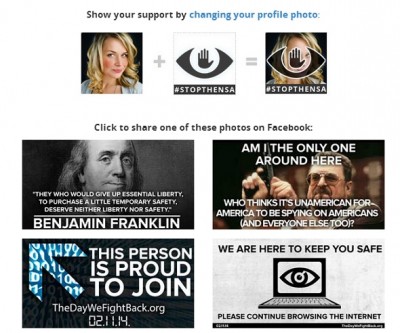
The Day We Fight Back banner, French translation. Graphic by Alec Perkins via Wikimedia Commons, (CC BY-4.0)
Since 2004, February 11 has been the worldwide “Day for a Safer Internet”, mainly focusing on safe web browsing for children and young people. A French website was set up for the occasion. But for online activists all over the world, the meaning of the day is about to change. This February 11, digital activists around the world will commemorate the life of Aaron Swartz and come together in a campaign against mass surveillance. This February 11 is “The Day We Fight Back“.
France is among those countries that have been more closely and overtly affected by mass Internet surveillance. After Edward Snowden's leaks became public, France's own practices of Internet surveillance soon appeared in plain sight. And in December 2013, the vote of the French Military Planning Act began to sound very much like a French version of the NSA – comprehensive description here [fr] – ringing alarms among activists in France and the world over [fr]. As explained by online NTIC magazine Numerama.com [fr]:
Depuis que la surveillance globale mise en œuvre par la NSA a été révélée par Edward Snowden, de multiples initiatives ont vu le jour pour s'y opposer. Cependant, aucune d'entre elles n'a eu pour l'instant un impact décisif. Certes, la bronca mondiale contre l'espionnage des communications a poussé Washington à initier une timide réforme de leurs pratiques, mais celles-ci n'ont pas été fondamentalement remises en cause.
Qu'à cela ne tienne. Puisque les précédentes approches n'ont pas abouti à un encadrement plus strict des activités des agences de renseignement, autant en essayer de nouvelles. C'est ainsi qu'est né le mouvement “The Day We Fight Back” (“le jour où nous contre-attaquons”), dont Presse-Citron vient de s'en faire l'écho. Il s'agit en fait de reproduire la même stratégie que celle qui a permis de faire reculer PIPA et SOPA.
Since the NSA-enforced global surveillance was disclosed by Edward Snowden, numerous initiatives emerged to confront it. However, none of them have had a significant impact thus far. Indeed, the global outcry against communications surveillance drove the US to initiate a feeble change of their practices, without wholly reconsidering them.
But never mind. As former approaches could not result in a more stringent control over intelligence agencies, let's try new ones. This is how the campaign “The Day We Fight Back” was launched, as echoed by Presse-Citron. The idea is to copy the same strategy as the one that helped defeat PIPA and SOPA.
La Quadrature du Net (@laquadrature on Twitter), the organization spearheading the fight for online freedoms in France, is leading the campaign. On January 31, 2014, they launched a crowdfunding campaign “to support the making of the upcoming animation movie about privacy, mass surveillance, and the urgency to rethink our relationship with technology.” The movie, entitled “Reclaim our privacy!” seeks donations [fr] via the crowdfunding website Ulule. La Quadrature du Net has also set up a NSA observer page, describing 71 programs, 35 “attack vectors” and 6 departments of the sprawling, opaque agency.
Framablog explains the actions [fr] planned on Feb. 11:
Le jour J, le collectif et les activistes qu’ils représentent téléphoneront et enverront des mails aux députés. Les propriétaires de sites web mettront en place des bannières pour encourager leurs visiteurs à combattre la surveillance et les employés d’entreprises technologiques demanderont que leur organisation fasse de même. Il sera demandé aux usagers d’Internet de créer des ”mèmes’’ et de changer leurs avatars sur les médias sociaux pour refléter leur demande.
On D-Day, the group and their activists will send phone calls and e-mails to MPs. The owners of websites will set up banners to encourage visitors to fight against surveillance, and the employees of tech businesses will ask their entity to do the same. Users will be invited to create memes and change their avatars on social medias to make their demand visible.
The call was passed on by activist Mohamed Sangare on his Mediapart blog.
Any individual concerned about mass government surveillance will be encouraged to call and email MPs and to sign the Thirteen Principles on Communications Surveillance, a set of principles for a privacy-protective digital world, developed by a coalition of activists and civil society experts on human rights law. A French translation of the principles can be found here.




